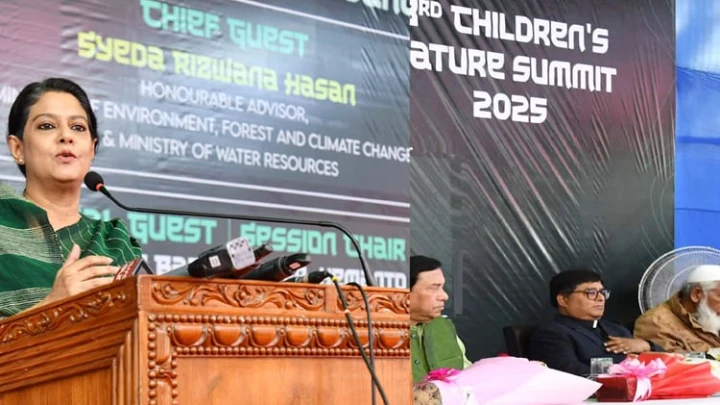Climate adaptive technology, innovation must for dev of agro based industries: Experts
BSS || Shining BD
Speakers at a roundtable today observed that climate adaptive technology, innovation must for development of agro based industries.
The climate change impact is posing a severe threat to the country's agriculture as well as to the overall economy as annual GDP set to shrink by 1.0 to 2.0 per cent for its consequences, they mentioned.
And required investment is crucial as investment of US $ 1.2 billion within 2030 could save $11.6 billion by 2030, while the savings will be $59 billion by2050, they added.
The observations were made by the speakers at the roundtable styled "Climate Adaptation: Opportunities for Bangladesh in Development of Agro-based Industries," organised by the
International Chamber of Commerce, Bangladesh (ICCB), UN's Food and Agriculture Organisation (FAO) and the Standard Chartered Bank at a city hotel, said a press release.
ICCB President Mahbubur Rahman chaired, while Agriculture Minister Dr Muhammad Abdur Razzaque, attended the roundtable as the chief guest and Environment, Forest and Climate Change Minister Md Shahab Uddin was special guest.
Standard Chartered Chief Executive Officer Naser Ezaz Bijoy FAO Representative Bangladesh Dr Nur Khondaker, CIRDAP Director General Dr Cherdsak Virapat also spoke.
Panelists also said a close collaboration between the private and public sector is needed to formulate policy to combat the climate change impacts for ensuring future food security of the country.
In his address, Dr Razzaque pointed out that a vast area of the country might unfortunately be inundated by sea water within next few decades.
He said the National Adaptation Plan of Bangladesh 2023-2050 lists development of agro food processing industries based on climate sensitive crop-zoning as a core intervention area.
"Promotion of mini-processing factories close to the production area, will contribute to building the capacity of our large majority of small holder farm men and women, promote local agrifood value chain development and contribute to lowering the global carbon footprint," said the minister.
"Use of digital technology in all stages of the agrifood value chain from production to post harvest management will help to enhance efficiency. The use of ICT for agriculture and market linkages is being expanded to enable critical flow of information and advisory services to farmers in rural and urban areas for fair price with profit margin", he said.
Shahab Uddin said agroforestry plays an essential role in climate adaptation by promoting biodiversity, enhancing soil health, and reducing the impacts of natural disasters.
"Integrating agroforestry practices into our agricultural landscape can foster resilience and sustainability while addressing climate change challenges," he said.
Mahbubur Rahman emphasized on the dynamic expansion of a sustainable agro-processing industry to keep economy as well as agriculture vibrant in a changing climatic condition.
He said Bangladesh is responsible for only 0.4 percent to global greenhouse gas (GHG) emissions which is insignificant compared to other mega industrial economies, but Bangladesh is high on the list of countries most vulnerable to climate change.
Given the current trajectory, the rapidly changing climate conditions will trigger annual GDP losses, in the range of 1.0 to 2.0 per cent. Beyond these macro implications, there are lasting consequences for food security due to the loss of arable land (up to 1.75 per cent every year), for education due to the breakdown of school infrastructure, for health due to high salinity and water logging, and for livelihood due to loss of income and assets, said Rahman.
He also mentioned that the agricultural exports from Bangladesh have been growing over 18 per cent for the last five years.
The global demand for agricultural product is also expected to grow by 15 per cent between 2019-2028 which provides a great opportunity to the Bangladesh processed food industry to expand its exports and help the country in its effort to diversify export, he said.
He also said ICC has established Agri-Food Hub (AFH), a collaborative ecosystem within the ICC network , bringing together businesses, institutions, experts, and academia in the agribusiness sector. It promotes multilateralism, sustainable development, and responsible practices to enhance global trade in the agri-food industry.
Shining BD
























